Related Research Articles
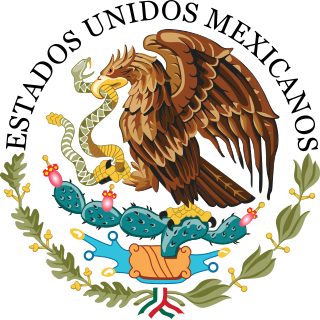
The politics of Mexico function within the framework of a federal presidential representative democratic republic whose government is based on a multi-party congressional system, where the President of Mexico is both head of state and head of government. The federal government represents the United Mexican States. It is divided into three branches: executive, legislative, and judicial, established by the Political Constitution of the United Mexican States, published in 1917. The constituent states of the federation must also have a republican government based on a congressional system established by their respective constitutions.

The United States Marshals Service (USMS) is a federal law enforcement agency in the United States. The Marshals Service serves as the enforcement and security arm of the U.S. federal judiciary, and it is an agency of the U.S. Department of Justice and operates under the direction of the U.S. Attorney General. U.S. Marshals are the original U.S. federal law enforcement officers, created by the Judiciary Act of 1789 during the presidency of George Washington as the "Office of the United States Marshal" under the U.S. District Courts. The USMS was established in 1969 to provide guidance and assistance to U.S. Marshals throughout the federal judicial districts.
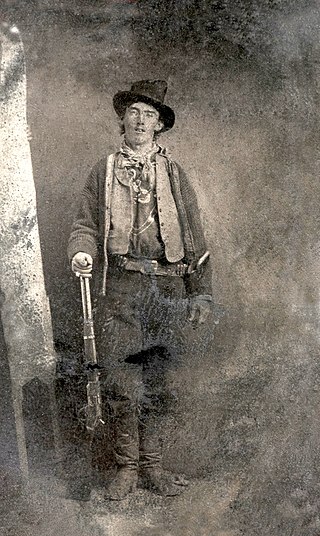
Henry McCarty, alias William H. Bonney, better known as Billy the Kid, was an American outlaw and gunfighter of the Old West who was linked to nine murders: four for which he was solely responsible, and five in which he may have played a role alongside others. He is also noted for his involvement in New Mexico's Lincoln County War.
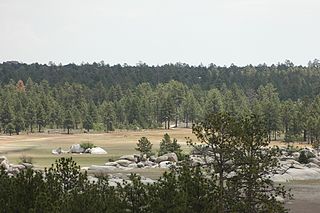
Baja California, officially the Free and Sovereign State of Baja California, is a state in Mexico. It is the northwesternmost of the 32 federal entities of Mexico. Before becoming a state in 1952, the area was known as the North Territory of Baja California. It has an area of 70,113 km2 (27,071 sq mi) and comprises the northern half of the Baja California peninsula, north of the 28th parallel, plus oceanic Guadalupe Island. The mainland portion of the state is bordered on the west by the Pacific Ocean; on the east by Sonora, the U.S. state of Arizona, and the Gulf of California; on the north by the U.S. state of California; and on the south by Baja California Sur.

The Congress of the Union, formally known as the General Congress of the United Mexican States, is the legislature of the federal government of Mexico. It consists of two chambers: the Senate of the Republic and the Chamber of Deputies. Its 628 members meet in Mexico City.

The Chamber of Deputies is the lower house of the Congress of the Union, the bicameral parliament of Mexico. The other chamber is the Senate. The structure and responsibilities of both chambers of Congress are defined in Articles 50 to 70 of the Constitution.

The Mexican Empire was a constitutional monarchy and the first independent government of Mexico. It was also the only former viceroyalty of the Spanish Empire to establish a monarchy after gaining independence. The empire existed from 1821 to 1823, making it one of the few modern-era independent monarchies in the Americas. To distinguish it from the later Second Mexican Empire (1864–1867) under Emperor Maximilian, this historical period is commonly referred to as the First Mexican Empire. The empire was led by former Royal Spanish military officer Agustín de Iturbide, who ruled as Agustín I.

Elections in Mexico are held every 6 years to elect a president and every 3 years to elect a legislature. These elections determine who, on the national level, takes the position of the head of state – the president – as well as the legislature.

The Mexican Democratic Party was a Catholic social conservative political party in Mexico that existed between 1979 and 1997. At its height in 1982, the party had over 500,000 active voters and 12 seats in the Mexican Chamber of Deputies.
Felipe Muñoz Kapamas is a Mexican former breaststroke swimmer. He competed at the 1968 and 1972 Summer Olympics and won a gold medal in the 200 m event in 1968. Since 2008, he is the President of the Mexican Olympic Committee. He served as Deputy of the LV and LXII Legislature of the Mexican Congress.

The nations of Mexico and South Africa established diplomatic relations in 1993. Bilateral relations between both nations have been characterized by a good level of political dialogue and by the mutual recognition of the leadership and involvement exercised by both countries in their respective regions.
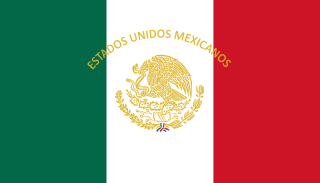
The president of Mexico, officially the president of the United Mexican States, is the head of state and head of government of Mexico. Under the Constitution of Mexico, the president heads the executive branch of the federal government and is the commander in chief of the Mexican Armed Forces. The office, which was first established by the federal Constitution of 1824, is currently held by Claudia Sheinbaum, who was sworn-in on October 1, 2024. The office of the president is considered to be revolutionary, in the sense that the powers of office are derived from the Revolutionary Constitution of 1917. Another legacy of the Mexican Revolution is the Constitution's ban on re-election. Mexican presidents are limited to a single six-year term, called a sexenio. No one who has held the post, even on a caretaker basis, is allowed to run or serve again. The constitution and the office of the president closely follow the presidential system of government.

The Federal Government of Mexico is the national government of the United Mexican States, the central government established by its constitution to share sovereignty over the republic with the governments of the 31 individual Mexican states, and to represent such governments before international bodies such as the United Nations.
Raúl Cervantes Andrade is a Mexican lawyer, academic, businessman and politician. He was CEO of CEA Abogados S.C., Vice-president of the National Chamber of Passage and Tourism Transportation and has been a Federal Deputy twice for PRI. He served as Senator of the LXII Legislature of the Mexican Congress from September 1, 2013 until August 30, 2014.
Salvador Vega Casillas is a Mexican politician affiliated with the PAN. He served as member of the Senate of the Republic (Mexico) (2012–2018). He also served as Deputy during the LIX Legislature, as well as a local deputy in the Congress of Michoacán.
The National Regeneration Movement, commonly referred to by its syllabic abbreviation Morena, is a major left-wing populist political party in Mexico. As of 2023, it is the largest political party in Mexico by number of members; it has been the ruling party since 2018, and it won a second term in the 2024 general election.

Social Encounter Party was a Mexican conservative political party established on the national level in 2014 and dissolved in 2018. It was part of the coalition Juntos Haremos Historia with the National Regeneration Movement and Mexico's Labor Party for the 2018 Mexican election.

The nations of Mexico and Thailand established diplomatic relations in 1975. Both nations are members of the Asia-Pacific Economic Cooperation, Forum of East Asia-Latin America Cooperation and the United Nations.
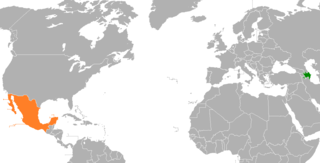
The nations of Azerbaijan and Mexico established diplomatic relations in 1992. Both nations are members of the United Nations.
The LXIII Legislature of the Congress of the Union, the 63rd session of the Congress of Mexico, was made up of senators and deputies that are members of their respective chambers. It convened on September 1, 2015, and concluded on August 31, 2018. It was succeeded by the LXIV Legislature in 2018.
References
- ↑ "Curricula". Chamber of Deputies. Archived from the original on 4 March 2016. Retrieved 11 October 2014.